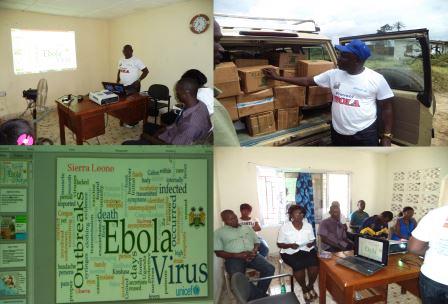Community Empowerment & Development Agency-(CEDA-SL)
46 Dambala Road, Southern Province, Bo.
 EBOLA TRAING AND DISTRIBUTION ON SOAP TO HEALTH CENTERS IN PUJEHUN
EBOLA TRAING AND DISTRIBUTION ON SOAP TO HEALTH CENTERS IN PUJEHUNFREETOWN/GENEVA/NEW YORK, 5 December 2014 - Around 2.4 million people will receive anti-malarial drugs during a UNICEF-supported campaign that begins today. As the malaria transmission season peaks in Sierra Leone, the move aims to reduce cases of malaria, ease the strain on the health system and allow true cases of Ebola to be found and treated.
“Malaria is the number one killer in Sierra Leone, but patients who may be infected do not seek care for fear of being shunned from health centres as suspected Ebola cases,” said Roeland Monasch, UNICEF Representative in the country. “People are dying in their communities for lack of diagnosis and treatment. This campaign will benefit the fight against both malaria and Ebola.”
The symptoms of malaria – fever, headache, aching joints – are so similar to Ebola in its early stages that it can easily be misdiagnosed, causing confusion among patients and health care workers and unnecessary referrals to Ebola Treatment Units.
Reducing the number of people exhibiting a high fever will result in less patients requiring screening and isolation care to eliminate Ebola as the cause of illness. It will also reduce the risk of malaria patients contracting Ebola.
Under the campaign, which has been supported by the German Government, more than 9,300 trained community health workers will go door-to-door in districts where the risk of Ebola is highest to help administer the anti-malarial tablets to everyone ages 6 months and above. Families will also be educated on the similarities of the symptoms of Ebola and malaria and the importance of taking this life-saving medicine.
“The success of the campaign will now depend on the parents and householders grasping this opportunity,” said Monasch. “The anti-malarial tablets are effective and must be taken as instructed by the health workers. In this way every citizen can play his or her part in reducing the misery and fatality caused by malaria in Sierra Leone, but also, importantly each citizen will be directly contributing to the efforts against Ebola too.”
A second round of this multi-partner anti-malaria drug distribution will take place in January 2015.
###
Note to editors: The Ministry of Health and Sanitation and the National Ebola Response Center are leading this campaign with support from UNICEF, in partnership with the Global Fund to Fight AIDS, Tuberculosis and Malaria, Médecins sans Frontières, the World Health Organization and Roll Back Malaria.
About UNICEF
UNICEF promotes the rights and wellbeing of every child, in everything we do. Together with our partners, we work in 190 countries and territories to translate that commitment into practical action, focusing special effort on reaching the most vulnerable and excluded children, to the benefit of all children, everywhere. For more information about UNICEF and its work visit: www.unicef.org
Download multimedia content at: http://weshare.unicef.org/mediaresources
Follow us on Twitter and Facebook
For further information, please contact:
Dheepa Pandian, on mission to Sierra Leone, +23278924378, dpandian@unicef.org
Sarah Crowe, on mission to Geneva, +1 646 209 1590, scrowe@unicef.org
Najwa Mekki, UNICEF New York, +1 917 209 1804, nmekki@unicef.org
Laurent Duvillier, UNICEF Dakar, +221 777 403 577, lduvillier@unicef.org
